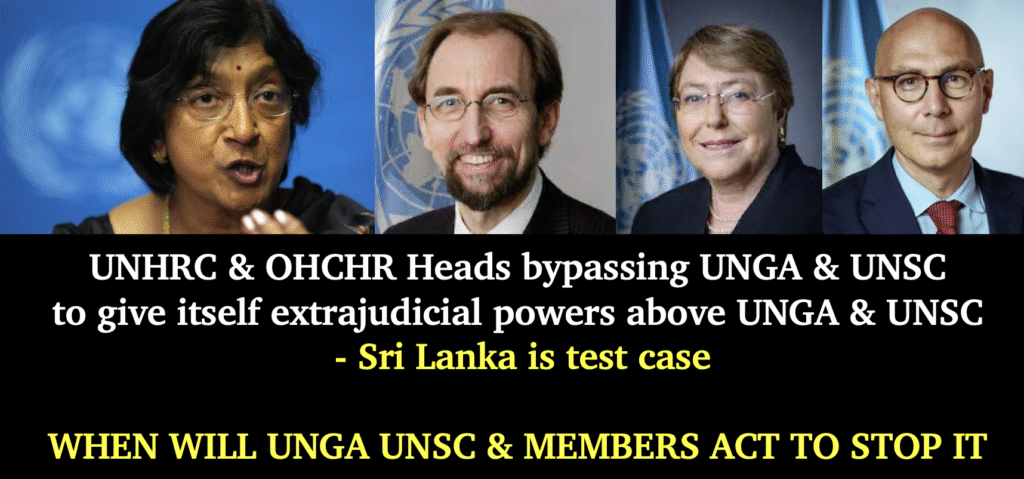Non-Binding but Deadly: How UNHRC Resolution A/HRC/60/21 (2025) could destroy Sri Lanka’s Sovereignty

UNHRC resolutions are technically non-binding. Yet for Sri Lanka, ending terrorism has been met with relentless scrutiny—a witch hunt targeting select war heroes and commanding officers. Every Resolution since 2009 has been a ticking time bomb, made worse by the 2015 co-sponsorship from the Ranil–Sirisena–Mangala “yahapalana” government. While lacking formal legal force, the nations backing A/HRC/60/21 (2025)—notably the UK, Canada, and EU states—can enforce these recommendations through sanctions, aid conditionalities, visa bans, military restrictions, and economic pressure. If passed, these “non-binding” recommendations will be weaponized politically, and the Sri Lankan government risks prioritizing their party survival over national sovereignty. This danger is amplified as Sri Lanka’s economic sovereignty is already constrained: the IMF controls key policy levers, the Central Bank operates independently of Sri Lanka’s legislature, and critical national assets remain in foreign hands. The only way forward is clear: Sri Lanka must reject these resolutions outright, realign with the Non-Aligned bloc, deepen ties with traditional friendly nations, and refuse to barter sovereignty for temporary political survival. To concede now is to risk becoming not a partner in the international community — but a protectorate.
Against this backdrop, UNHRC demands — from a Truth & Reconciliation Commission to full 13th Amendment implementation and external accountability — are Trojan horses designed to dismantle sovereignty from within, redraw governance structures, and keep Sri Lanka permanently under watch.
This is colonialism re-defined & restructured.
Sri Lanka has already erred in the past by believing compromise would ease the pressure. Co-sponsoring resolutions, flirting with hybrid courts, and entertaining “international assistance” only emboldened those determined to rewrite the country’s history and dictate its future. The lesson is clear: Surrender and appeasement, only means demands grow more dangerous.
Immediate Term (0–3 months): Sanctions & Diplomatic Pressure
- UNHRC Resolution Passed– Though “non-binding” Western blocs voting for resolution will consider it mandatory.
- Visa bans / travel restrictions against military & political figures named in OHCHR/ITJP reports – may even deny children travel, scholarships or admissions.
- Foreign pressure increaseson Sri Lanka to show “good faith” – setting up Truth & Reconciliation mechanisms, or else face punitive measures.
- Economic chokehold begins– IMF conditions tightened; loan tranches delayed unless Sri Lanka “cooperates with Geneva.” Carrot.
- Sovereignty hit:Central Bank already beyond elected government’s control, enforcing IMF austerity without people’s consent.
- Who is impacted first:Military leadership, political elites, war heroes, and the poor (with fuel, electricity, and tax hikes).
Short Term (3–6 months): Appeasement Phase: Government Trapped
- Pressure to implement 13A fully– devolution of police & land powers to Provincial Councils, weakening central governance. Even possibility of a UDI/separate state. Military removed from the North and East, Camps closed down.
- TRC (Truth & Reconciliation Commission) set upunder UN guidelines, opening door for foreign “experts” to sit in judgment of Sri Lankans.
- Targeted sanctionsexpand on businesses linked to military/political figures — banks and companies begin “de-risking” Sri Lanka.
- Asset transfers accelerate– national infrastructure (ports, energy, telecom, plantations) negotiated into foreign hands under “debt restructuring.”
- Sovereignty hit:Sri Lanka loses decision-making over its economy, while national security is compromised by loss of central powers.
- Who is impacted first:Military families, public sector in North/East, workers in state enterprises facing privatization.
Medium Term (6–12 months): A Nation being disempowered
- Hybrid accountability demands escalate– calls for international judges, prosecutors, and investigators to override domestic law.
- UN monitors embeddedin Sri Lankan institutions under guise of “capacity building.”
- IMF-driven austerity deepens– currency devaluation, tax hikes, welfare cuts, fuel/electricity privatization.
- Central Bank, under IMF line, blocks domestic relief measures, widening public suffering.
- Foreign corporates take controlof key resources (energy grids, ports, agriculture, water supply).
- Sovereignty hit:Government becomes a figurehead, with real decision-making power held by IMF, UN, and foreign investors.
- Who is impacted first:General population (price hikes, job losses), farmers & fisherfolk (as land/water access shifts to corporates).
Long Term (12–24 months): National Disintegration
- Permanent UN oversight– Sri Lanka placed under a “special human rights monitoring mandate,” legitimizing foreign interference.
- Provincial Councils emboldened– external actors exploit devolved powers to push federalism/separatism.
- Economic colonization complete– Ports, airports, utilities, and natural resources are majority foreign-owned.
- Debt-for-assets swaps finalised– Sri Lanka’s weak anti-national government will trade away sovereignty for survival.
- Foreign security interests embedded– military bases / “strategic access points” leased out under cover of foreign investment.
- Sovereignty hit:Sri Lanka ceases to function as an independent state — reduced to a protectorate under foreign control. Sovereign in name only.
- Who is impacted first:Entire population — loss of sovereignty means loss of future generations’ independence.
The danger is not Geneva alone, but Geneva + IMF + foreign corporate takeovers working in tandem. The “non-binding” resolutions are the political battering ram; IMF dependency is the economic stranglehold; and asset privatization is the Trojan horse. Together, they dismantle sovereignty piece by piece until Sri Lanka is left independent in name only.
What can and should Sri Lankans do?
Shenali D Waduge







